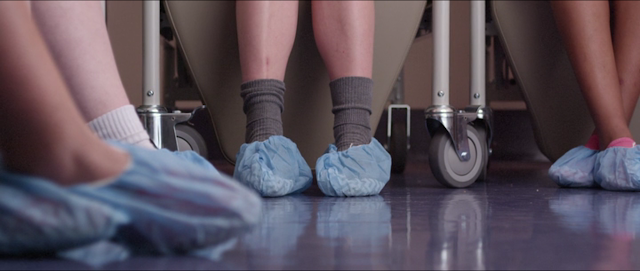Fine couture and exceptional stage play may not be the only eye-catching factors of this film. It may be deemed as the tragic story of the century--true, in many forms--but it does have a heart, red and blue and beating on its own purpose: to tug at our expectations and throw it along with the characters we grew up seeing on TV. It's brutally annihilating in the sense that it's all lovey-dovey and fairytale-like; the wild reds and blues is a ferocious juxtaposition of the story. It was fast-paced, almost too hard to keep up with, but we can only agree with how it should naturally seem like it, because the two doomed lovers were bound to be caged. The thrilling scenes were perfectly formulated, speaking to the olden Parisian film tradition. Love-donned, painful, and lip-parting.
This is the livid representation of female empowerment. Its raw, undulated yet sharp humor takes action in the character's lives. Faithfully following the feminist manifesto, it tries to be the bible of what it takes to be a damsel in distress, helped by former damsels in distress but most of the time, she's got herself all figured out. The film itself is a quiet revolution, soaking in its own noisy war cry. The monologue may be too surprising for some, for it portrays women the way it should be, and that's arguably the best thing about this. It may have some lapses on some scenes, but the story redeems all empty spaces that were left out, either consciously or unconsciously.
this may have been Brian de Palma's reply to Coppola's The Godfather, in all its greedy and tragic forms. The main player, played by the brooding man that is Al Pacino, smelled absolutely like the Mafia don, reminiscent of the former glory of the Ring. Although we are introduced with a seemingly identical hallmark that is Vito Corleone, we are constantly reminded that they are two different people with similar fateful lives. Godfather plays on the sentimental status as Scarface replies in a brutal, no-holds-barred vengeance. It doesn't for one second take part in sentimentality, a fact quite too heartbreaking to accept. The perversion of tragedy was too greedy, and there was no consideration for emotion at all. It was boldly admitted on the first scene, but it wasn't what we all expected. It's busy, self-identified, and satirical.
The grime this film showed was unforgivable in all its senses, for it didn't do so much for me. Exhibited by loose-handed cameras, it shows the tragedies of people in a sleepy town. It tried so hard to evoke something, but it didn't. Its criminally honest storytelling is of no emotional value, and the actors bore no motivation to digress. It's a total waste of time, and regretfully unfortunate for it to come from Korine. Talk about the effortless drive to be important, and the wrong usage of aestheticism.
Rear Window (1954) dir. Alfred Hitchcock
For the movie to be branded as a sullen, and typical pastime would be too premature if you judged it within the first several minutes. It might seem like it, but it doesn't bow down to the audience's expectations. Especially because it's a sin for Hitchcock to drift away from his style. The shrewdness of the detective may be symbolized as the New York apartment dwellers' stubborn act of being observant to their neighbors' lives. Distance is the only thing that identifies the dichotomy between these people, and it's such a comical stunt, a surprising one from the thriller genius. It's an amusing play between routinely acts and eventful capers, and Hitchcock, once again, genuinely and willfully played it out. The careful transition between ease and irk was bearable enough for me to understand, yet still sent me to a complete stupor.
Comedies progressed backwards for us, and it's undeniably heartbreaking. This feature may be one of them but it does compensate for the fact that merriment comes alive still when you grow old. The film itself is not quite what I expected, coming from Poehler and Fey, but it does somehow tickle the high school mentality that never seems to go away, as it looks like an ode to the past. It was funny and raunchy, something I've always admired from Paula Pell. The actors were restless, thank god.
The sudden belting of the song in the beginning sent me the conclusion that this would end up how I wanted it to, which was disappointing. But it still did something that indulges in the female intuition, and it's not so bad after all. The bleak colors and the sudden pink of this particular scene sends you the vibe that something is happening, and true enough, something did. Fulfillment of dreams for the protagonist was a bright possibility, and it didn't do the job of keeping the audience at the edge of their seats. The future was too possible it didn't intrigue me as much. But the script was smart and straight-to-the-point badass, which compensates for the inevitability of the plot I unfortunately experienced.








No comments:
Post a Comment